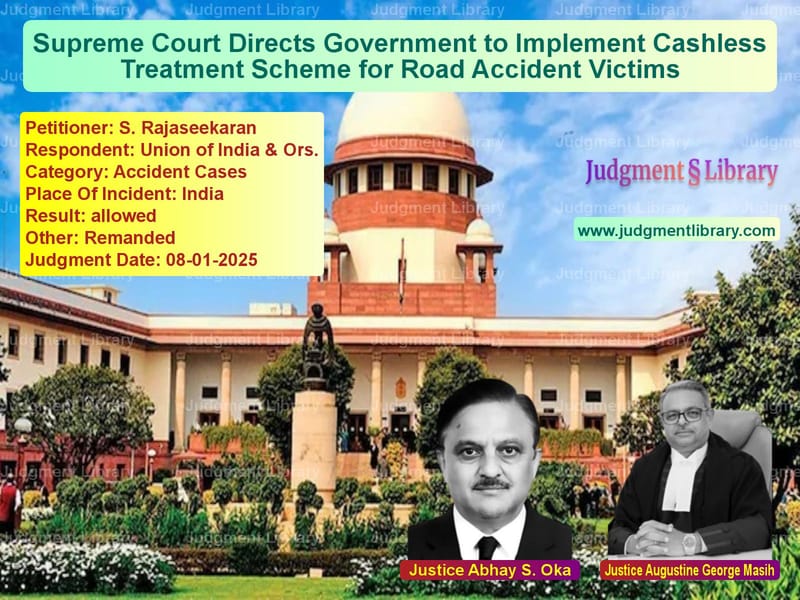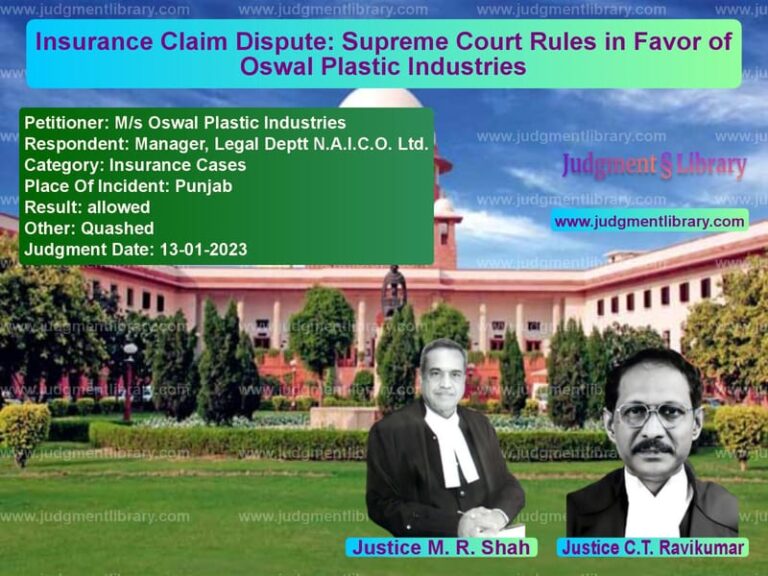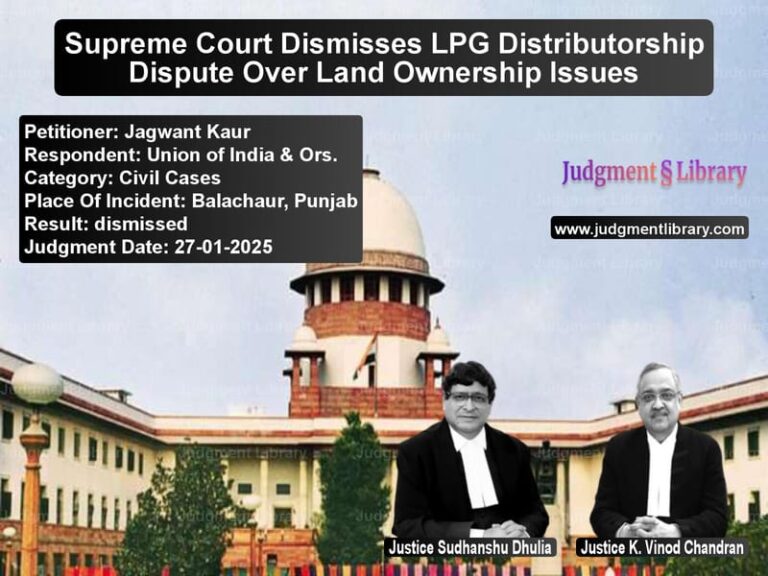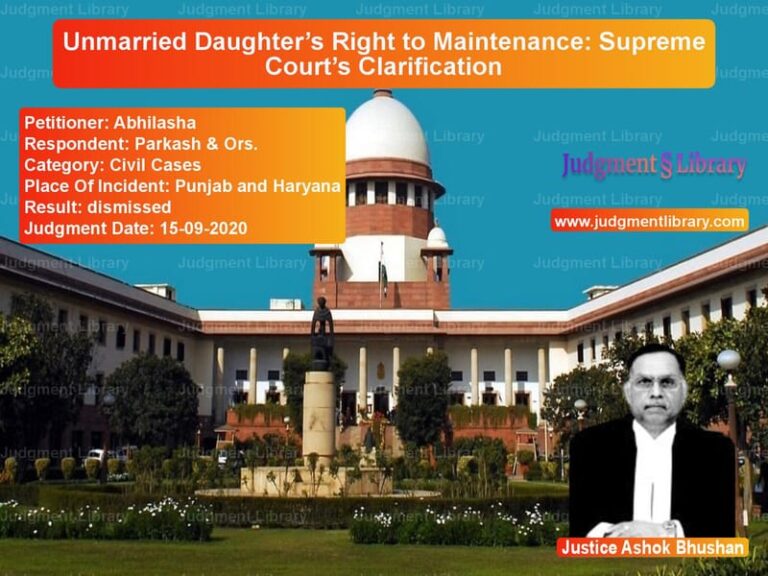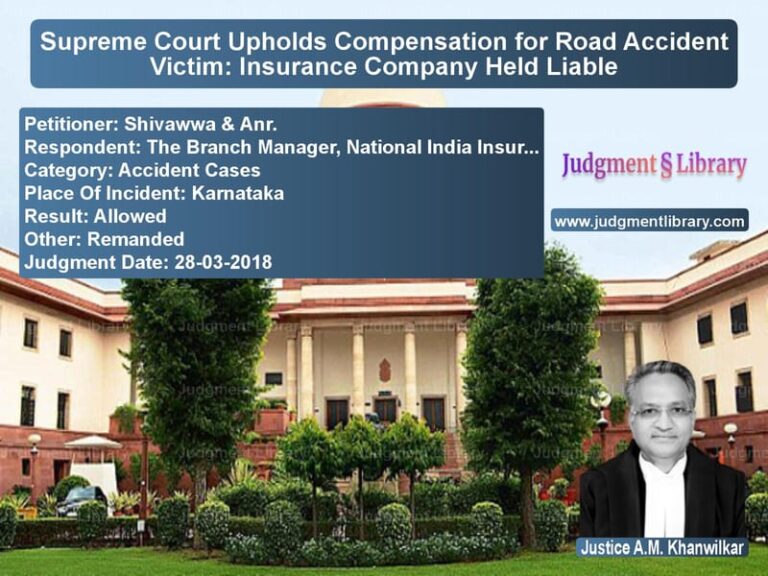Supreme Court Directs Government to Implement Cashless Treatment Scheme for Road Accident Victims
The case of S. Rajaseekaran vs. Union of India & Ors. revolves around the implementation of cashless treatment for road accident victims during the ‘golden hour.’ The Supreme Court issued this ruling to ensure that victims receive immediate medical assistance without financial hurdles. The case underscores the failure of the Central Government to implement the scheme as mandated under Section 162 of the Motor Vehicles Act, 1988.
The ruling also examines the statutory obligations of the government in providing funding mechanisms through the Motor Vehicle Accident Fund, established under Section 164-B of the Act.
Background of the Case
The petitioner, S. Rajaseekaran, had filed a writ petition seeking the enforcement of provisions under the Motor Vehicles Act to ensure that accident victims receive immediate and free medical attention within the first hour, which is crucial in saving lives.
Key Legal Provisions in Question
- Section 162 of the Motor Vehicles Act, 1988: Mandates the creation of a scheme for cashless treatment of accident victims during the ‘golden hour.’
- Section 164-B of the Motor Vehicles Act, 1988: Establishes the Motor Vehicle Accident Fund to finance the medical treatment of accident victims.
- Central Motor Vehicles (Motor Vehicle Accident Fund) Rules, 2022: Provides a framework for the fund’s utilization, including cashless treatment.
Petitioner’s Arguments
The petitioner contended that despite the enactment of Sections 162 and 164-B on April 1, 2022, the Central Government had failed to implement the scheme, leading to preventable deaths. The key arguments presented were:
- Road accident victims often die due to the lack of immediate medical assistance.
- Despite the legislative mandate, no operational scheme had been implemented for cashless treatment.
- The government’s inaction violated Article 21 of the Constitution, which guarantees the right to life.
- A ‘golden hour’ scheme must be established urgently to prevent unnecessary fatalities.
Respondent’s Arguments
The Union of India and related authorities provided the following responses:
- A draft concept note on the ‘golden hour’ scheme had been prepared, outlining financial provisions for medical treatment.
- The proposed scheme capped medical coverage at Rs. 1,50,000 per victim and limited treatment to seven days.
- The government required more time to finalize the scheme.
Supreme Court’s Analysis
The Supreme Court strongly criticized the government’s delay in implementing the scheme despite statutory obligations.
Key Observations:
- “The golden hour is the most crucial time for saving lives after an accident. Any delay in medical intervention significantly reduces survival chances.”
- “Despite the law mandating a cashless treatment scheme, the government has failed to frame and implement it.”
- “The government’s inaction violates the fundamental right to life under Article 21 of the Constitution.”
The Court also examined previous rulings, including Parmanand Katara v. Union of India (1989), which held that hospitals must provide immediate medical assistance to accident victims without waiting for police formalities.
Final Directions by the Supreme Court
The Supreme Court issued stringent directives to the Central Government to ensure the immediate implementation of the ‘golden hour’ scheme:
Mandatory Implementation of the Scheme:
- The Central Government must finalize and implement the cashless treatment scheme under Section 162 by March 14, 2025.
- The government must submit a copy of the scheme and an affidavit explaining its implementation by March 21, 2025.
Utilization of the Motor Vehicle Accident Fund:
- The government must allocate funds from the Motor Vehicle Accident Fund to support cashless treatment.
- The government must ensure that financial limitations do not hinder accident victims from receiving life-saving treatment.
Digital Monitoring and Implementation:
- The General Insurance Council (GIC) must develop an online portal for hospitals to report and process accident claims.
- State authorities must coordinate with hospitals to expedite the reimbursement of medical expenses.
Ensuring Claim Settlement for Hit-and-Run Cases:
- The GIC must process claims using only the following seven key documents:
- Copy of FIR
- Copy of Post-Mortem Report/Injury Report
- Copy of Death Certificate
- Bank details of claimant
- Identity proof of claimant
- Identity proof of victim
- Any amount received for cashless treatment
- The government must report on the status of pending claims by March 14, 2025.
Conclusion
This landmark ruling reinforces the urgent need for a cashless treatment scheme for road accident victims. By setting clear deadlines for implementation, the Supreme Court has ensured that the government prioritizes public safety and access to emergency medical care.
With the introduction of a digital monitoring system and simplified claim settlement processes, the ruling also addresses existing bureaucratic delays. The decision underscores the judiciary’s role in upholding fundamental rights and ensuring government accountability in matters of public health and road safety.
Petitioner Name: S. Rajaseekaran.Respondent Name: Union of India & Ors..Judgment By: Justice Abhay S. Oka, Justice Augustine George Masih.Place Of Incident: India.Judgment Date: 08-01-2025.
Don’t miss out on the full details! Download the complete judgment in PDF format below and gain valuable insights instantly!
Download Judgment: s.-rajaseekaran-vs-union-of-india-&-ors-supreme-court-of-india-judgment-dated-08-01-2025.pdf
Directly Download Judgment: Directly download this Judgment
See all petitions in Compensation Disputes
See all petitions in Motor Vehicle Act
See all petitions in Negligence Claims
See all petitions in Judgment by Abhay S. Oka
See all petitions in Judgment by Augustine George Masih
See all petitions in allowed
See all petitions in Remanded
See all petitions in supreme court of India judgments January 2025
See all petitions in 2025 judgments
See all posts in Accident Cases Category
See all allowed petitions in Accident Cases Category
See all Dismissed petitions in Accident Cases Category
See all partially allowed petitions in Accident Cases Category

